Abstract
The derangements in energy/substrate metabolism seen in oncology patients are similar regardless of the tumor's site of origin, and in advanced disease these metabolic derangements can be manifested as cancer cachexia. The relationship between tumor size and the degree of metabolic abnormality, however, remains unclear. Using primed constant infusions of stable and radiolabeled isotopes and indirect calorimetry, the authors have determined the rates of net protein catabolism (NPC), glucose oxidation, Cori cycling of glucose, and oxygen consumption in 85 patients with cancer. They have assessed the association between bulk of tumor and metabolic abnormality using regression analysis. A positive correlation was found between tumor bulk and the rates of NPC (r2 = 0.8), plasma glucose appearance (r2 = 0.72), plasma glucose clearance (r2 = 0.70), the percentage of tissue glucose uptake recycled to lactate (r2 = 0.62), and oxygen consumption (r2 = 0.79). The percentage of tissue glucose uptake oxidized was negatively correlated with tumor bulk (r2 = 0.75). The data indicate that the degree of metabolic abnormality seen in cancer patients is closely related to the quantity of malignant tissue present. Progressive increase in tumor size is associated with an increase in peripheral substrate mobilization, an increase in the rate of hepatic glucose production, an increase in tissue glucose uptake, an increase in energy-expensive glucose cycling to lactate, and an increase in protein loss.
Full text
PDF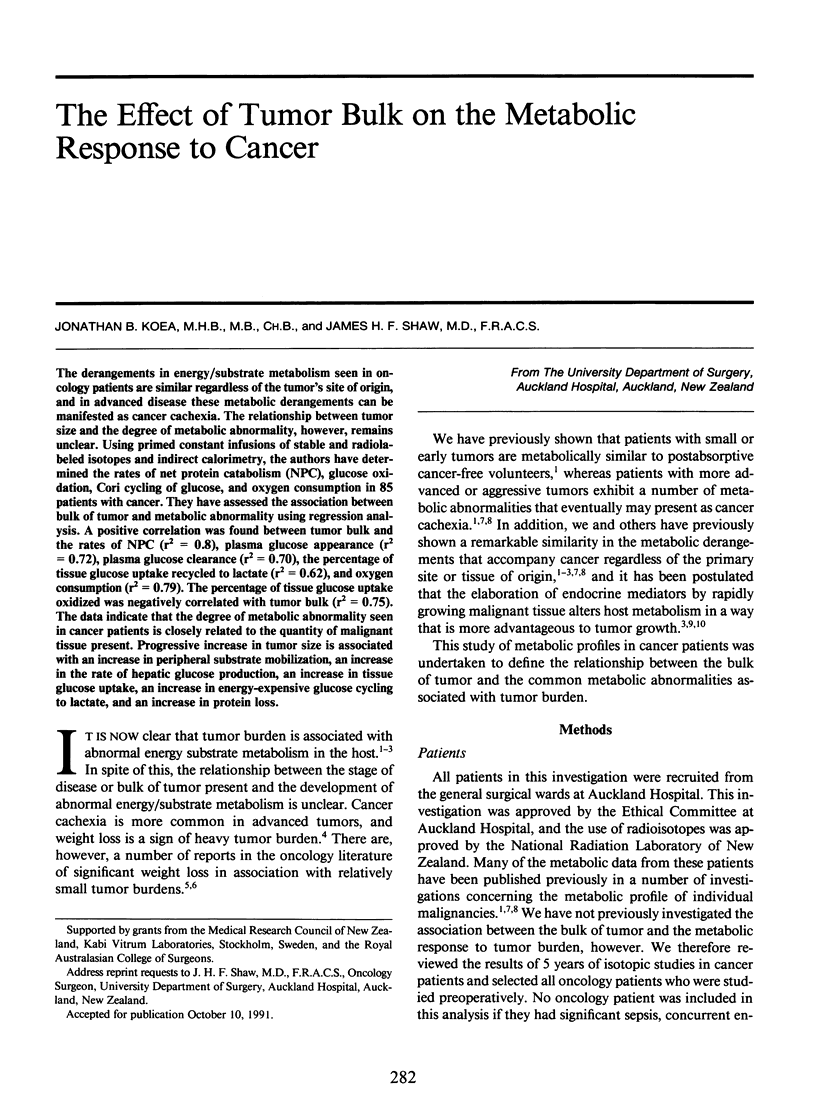
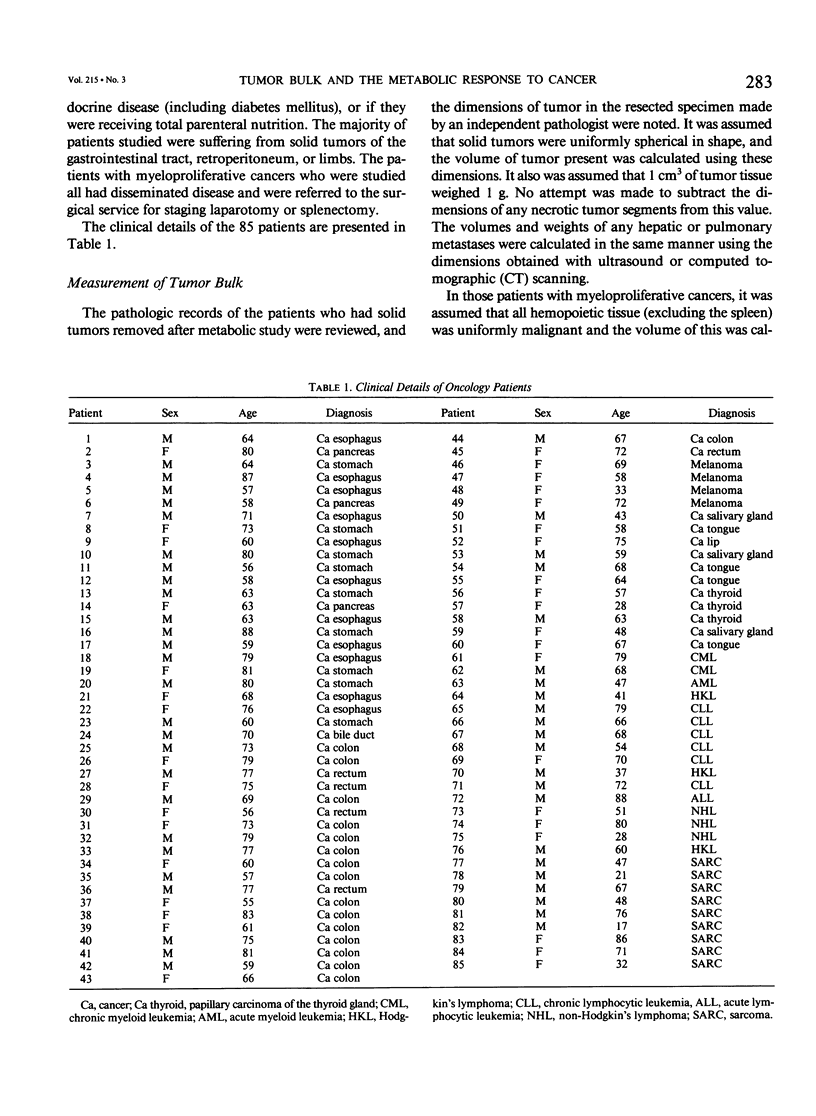
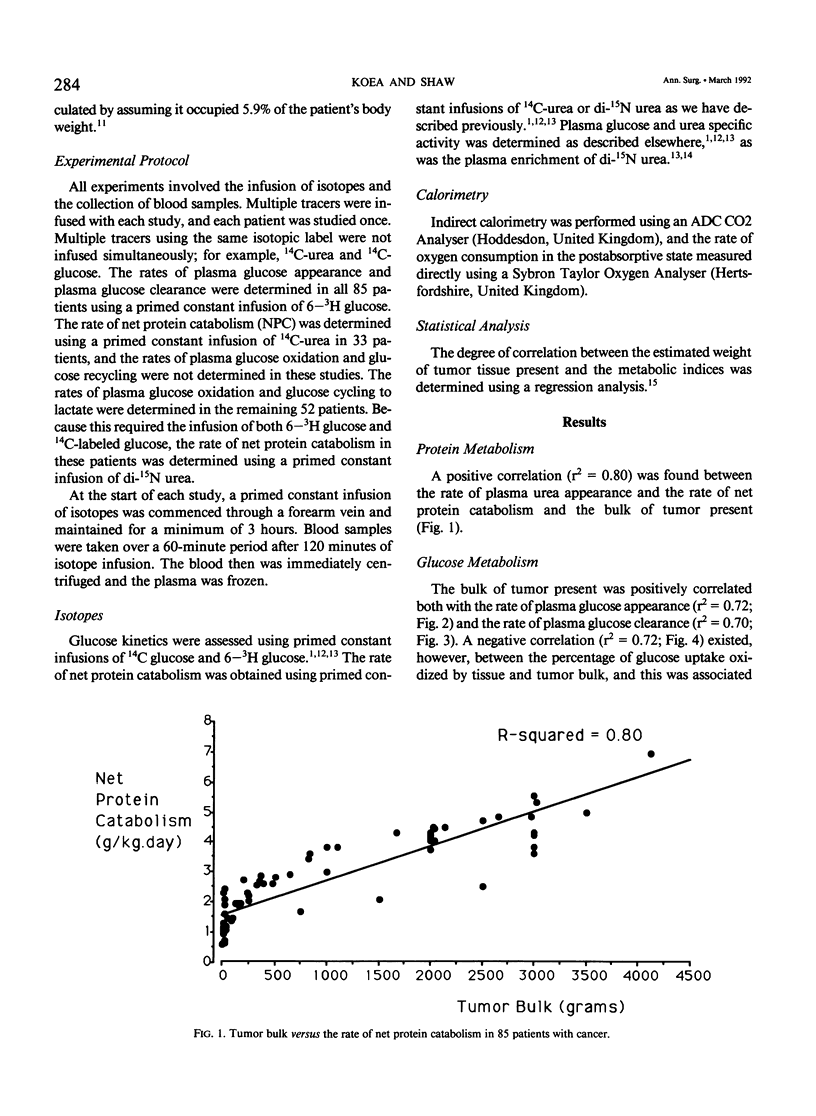
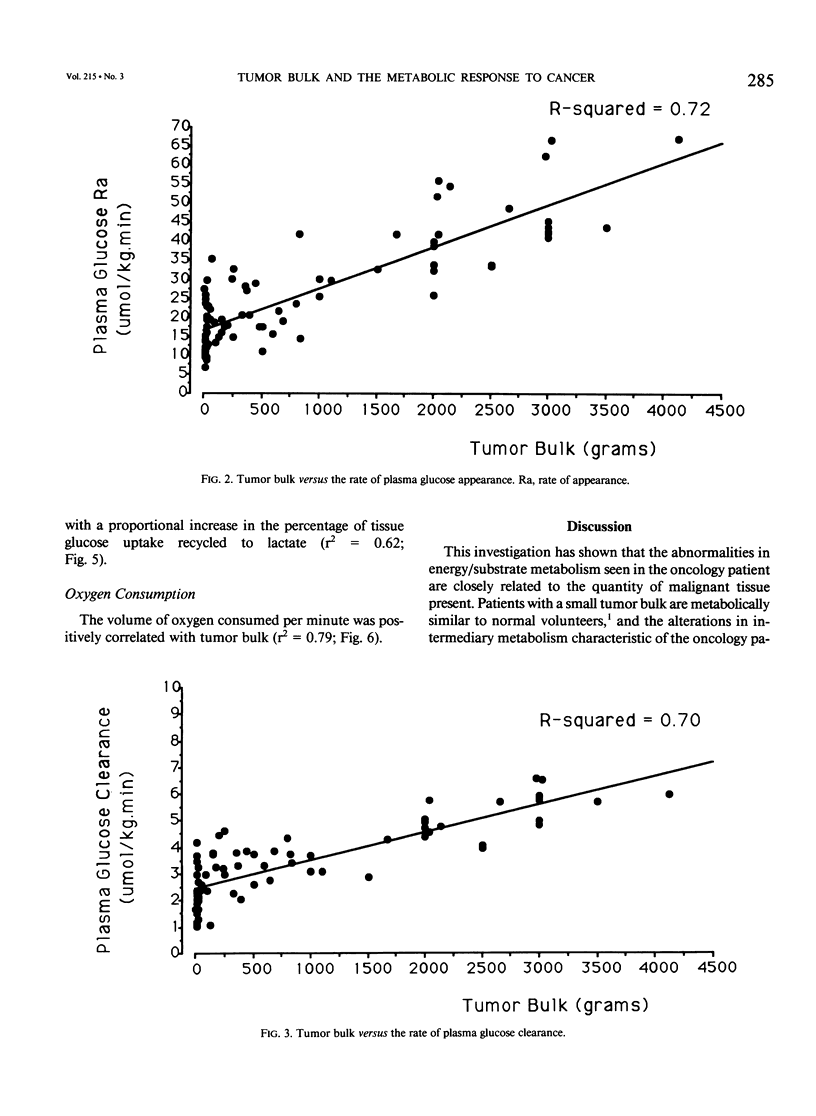
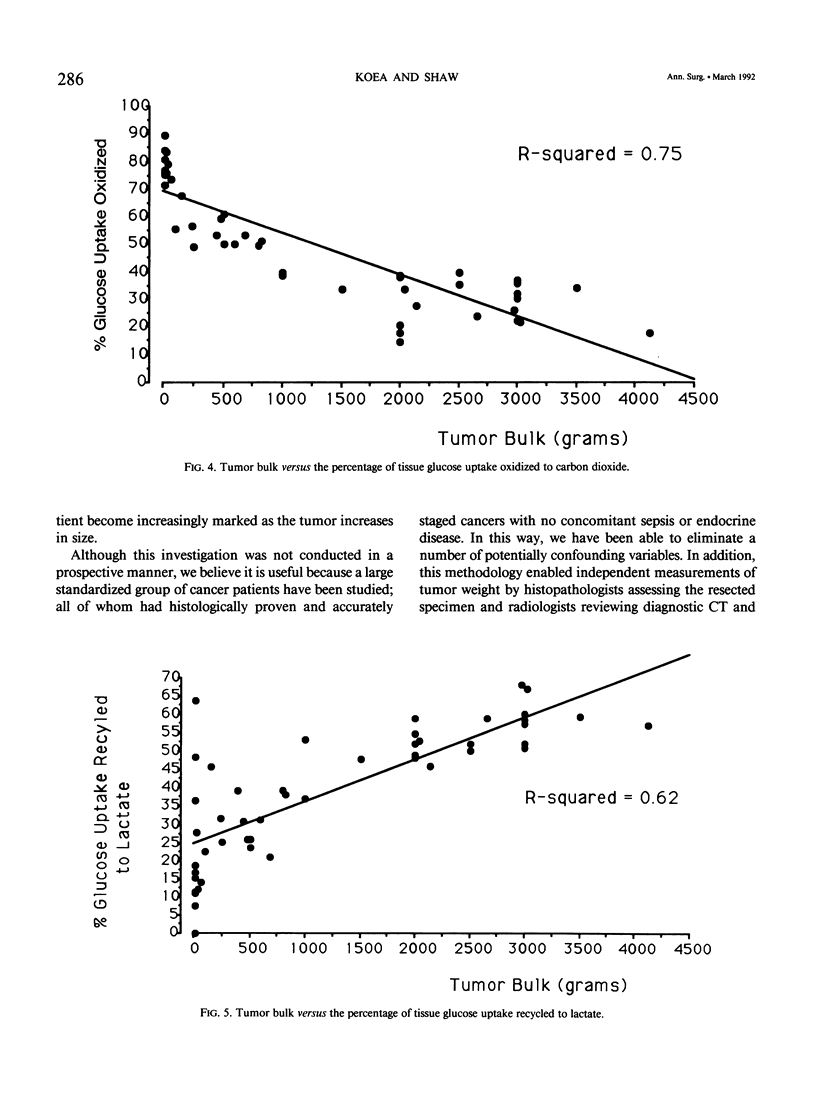
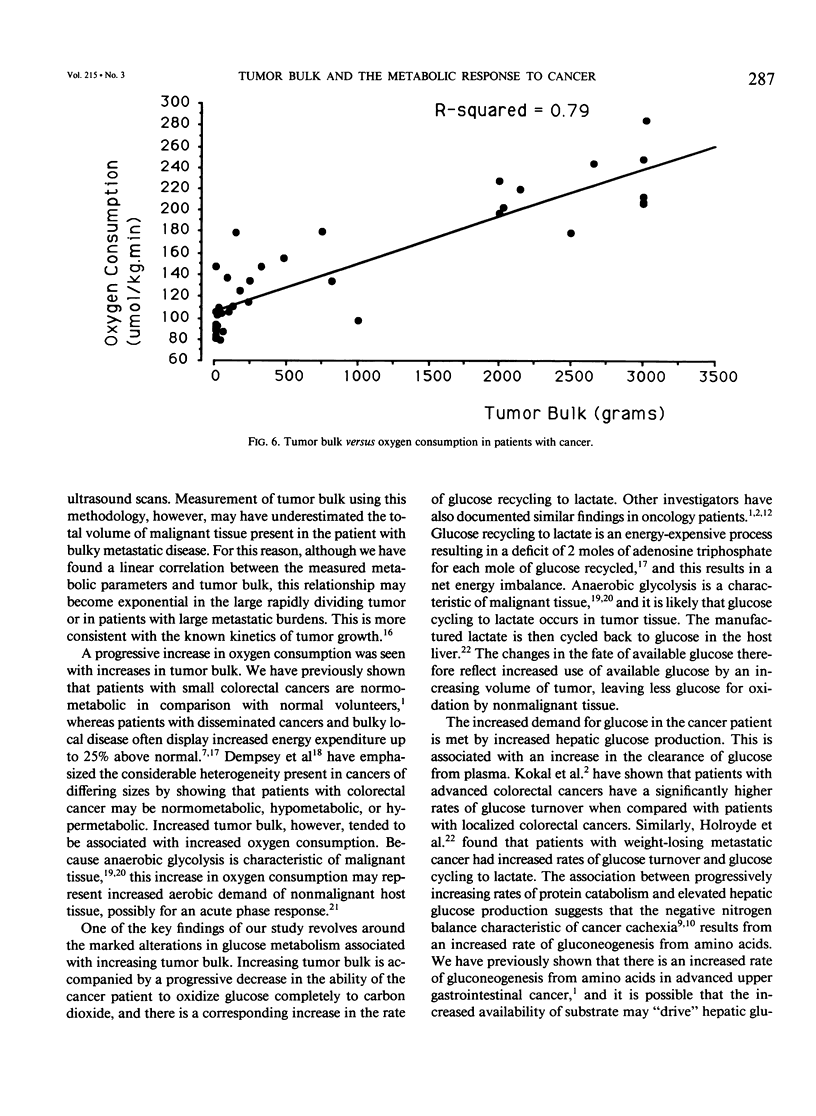
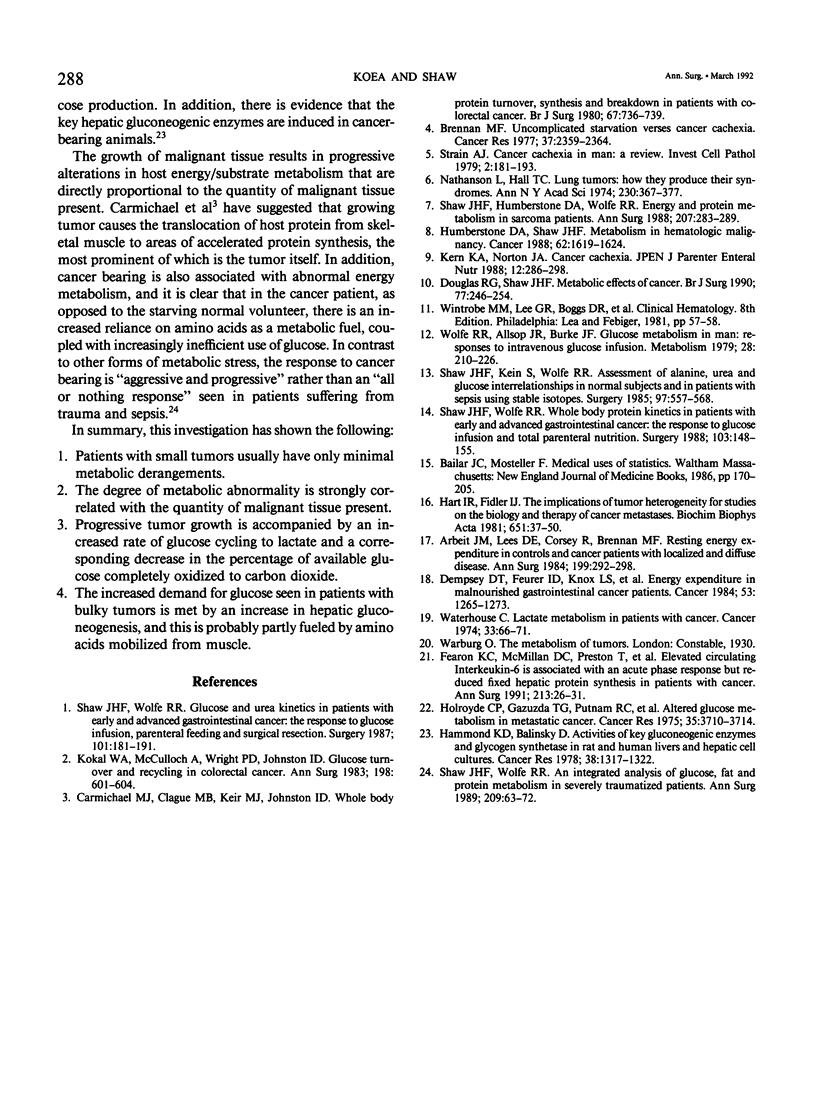
Selected References
These references are in PubMed. This may not be the complete list of references from this article.
- Arbeit J. M., Lees D. E., Corsey R., Brennan M. F. Resting energy expenditure in controls and cancer patients with localized and diffuse disease. Ann Surg. 1984 Mar;199(3):292–298. doi: 10.1097/00000658-198403000-00008. [DOI] [PMC free article] [PubMed] [Google Scholar]
- Brennan M. F. Uncomplicated starvation versus cancer cachexia. Cancer Res. 1977 Jul;37(7 Pt 2):2359–2364. [PubMed] [Google Scholar]
- Dempsey D. T., Feurer I. D., Knox L. S., Crosby L. O., Buzby G. P., Mullen J. L. Energy expenditure in malnourished gastrointestinal cancer patients. Cancer. 1984 Mar 15;53(6):1265–1273. doi: 10.1002/1097-0142(19840315)53:6<1265::aid-cncr2820530609>3.0.co;2-2. [DOI] [PubMed] [Google Scholar]
- Douglas R. G., Shaw J. H. Metabolic effects of cancer. Br J Surg. 1990 Mar;77(3):246–254. doi: 10.1002/bjs.1800770305. [DOI] [PubMed] [Google Scholar]
- Fearon K. C., McMillan D. C., Preston T., Winstanley F. P., Cruickshank A. M., Shenkin A. Elevated circulating interleukin-6 is associated with an acute-phase response but reduced fixed hepatic protein synthesis in patients with cancer. Ann Surg. 1991 Jan;213(1):26–31. doi: 10.1097/00000658-199101000-00005. [DOI] [PMC free article] [PubMed] [Google Scholar]
- Hammond K. D., Balinsky D. Activities of key gluconeogenic enzymes and glycogen synthase in rat and human livers, hepatomas, and hepatoma cell cultures. Cancer Res. 1978 May;38(5):1317–1322. [PubMed] [Google Scholar]
- Hart I. R., Fidler I. J. The implications of tumor heterogeneity for studies on the biology of cancer metastasis. Biochim Biophys Acta. 1981 Aug 31;651(1):37–50. doi: 10.1016/0304-419x(81)90004-4. [DOI] [PubMed] [Google Scholar]
- Holroyde C. P., Gabuzda T. G., Putnam R. C., Paul P., Reichard G. A. Altered glucose metabolism in metastatic carcinoma. Cancer Res. 1975 Dec;35(12):3710–3714. [PubMed] [Google Scholar]
- Humberstone D. A., Shaw J. H. Metabolism in hematologic malignancy. Cancer. 1988 Oct 15;62(8):1619–1624. doi: 10.1002/1097-0142(19881015)62:8<1619::aid-cncr2820620827>3.0.co;2-c. [DOI] [PubMed] [Google Scholar]
- Kern K. A., Norton J. A. Cancer cachexia. JPEN J Parenter Enteral Nutr. 1988 May-Jun;12(3):286–298. doi: 10.1177/0148607188012003286. [DOI] [PubMed] [Google Scholar]
- Kokal W. A., McCulloch A., Wright P. D., Johnston I. D. Glucose turnover and recycling in colorectal carcinoma. Ann Surg. 1983 Nov;198(5):601–604. doi: 10.1097/00000658-198311000-00007. [DOI] [PMC free article] [PubMed] [Google Scholar]
- Nathanson L., Hall T. C. A spectrum of tumors that produce paraneoplastic syndromes. Lung tumors: how they produce their syndromes. Ann N Y Acad Sci. 1974;230:367–377. doi: 10.1111/j.1749-6632.1974.tb14471.x. [DOI] [PubMed] [Google Scholar]
- Shaw J. H., Humberstone D. M., Wolfe R. R. Energy and protein metabolism in sarcoma patients. Ann Surg. 1988 Mar;207(3):283–289. doi: 10.1097/00000658-198803000-00010. [DOI] [PMC free article] [PubMed] [Google Scholar]
- Shaw J. H., Klein S., Wolfe R. R. Assessment of alanine, urea, and glucose interrelationships in normal subjects and in patients with sepsis with stable isotopic tracers. Surgery. 1985 May;97(5):557–568. [PubMed] [Google Scholar]
- Shaw J. H., Wolfe R. R. An integrated analysis of glucose, fat, and protein metabolism in severely traumatized patients. Studies in the basal state and the response to total parenteral nutrition. Ann Surg. 1989 Jan;209(1):63–72. doi: 10.1097/00000658-198901000-00010. [DOI] [PMC free article] [PubMed] [Google Scholar]
- Shaw J. H., Wolfe R. R. Glucose and urea kinetics in patients with early and advanced gastrointestinal cancer: the response to glucose infusion, parenteral feeding, and surgical resection. Surgery. 1987 Feb;101(2):181–191. [PubMed] [Google Scholar]
- Shaw J. H., Wolfe R. R. Whole-body protein kinetics in patients with early and advanced gastrointestinal cancer: the response to glucose infusion and total parenteral nutrition. Surgery. 1988 Feb;103(2):148–155. [PubMed] [Google Scholar]
- Strain A. J. Cancer cachexia in man: a review. Invest Cell Pathol. 1979 Jul-Sep;2(3):181–193. [PubMed] [Google Scholar]
- Waterhouse C. Lactate metabolism in patients with cancer. Cancer. 1974 Jan;33(1):66–71. doi: 10.1002/1097-0142(197401)33:1<66::aid-cncr2820330113>3.0.co;2-0. [DOI] [PubMed] [Google Scholar]
- Wolfe R. R., Allsop J. R., Burke J. F. Glucose metabolism in man: responses to intravenous glucose infusion. Metabolism. 1979 Mar;28(3):210–220. doi: 10.1016/0026-0495(79)90066-0. [DOI] [PubMed] [Google Scholar]


